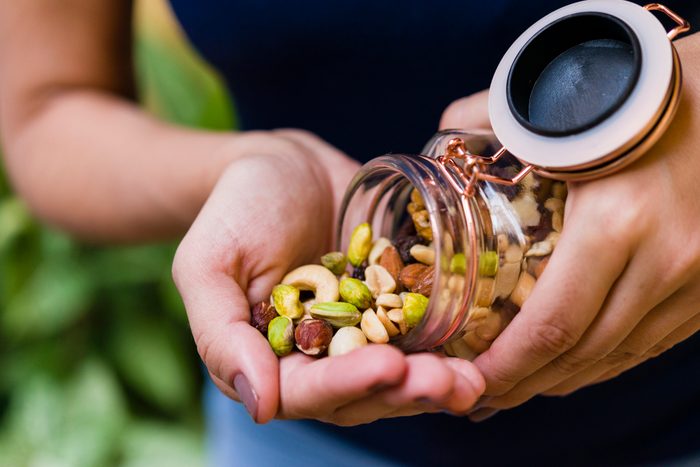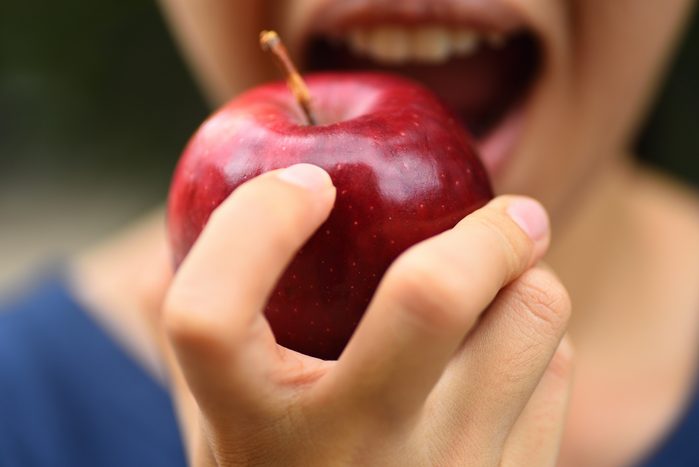
They say travel is like food for the soul—but nothing can throw off your trip like catching a cold or sightseeing with a dodgy tummy. You have that great meal, or that hectic tour schedule, maybe not enough sleep, or that hotel room bathroom shared with a travel buddy who’s not 100 percent familiar with your routine.
“When we travel, our normal routines change drastically,” says Megan Barnett, MS, certified nutrition specialist and functional medicine practitioner. We sleep differently, we eat differently, we might forget our vitamins, and our exercise routines are disrupted—all of which can be hard on bodily functions…particularly, digestion. “Even changing time zones can really impact how we feel, as digestion and elimination are a natural part of our body’s circadian rhythm.”
So to help take the discomfort out of your incredible itinerary, Barnett and other experts tell The Healthy @Reader’s Digest easy tips to keep your body at ease whenever you’ve got a world to see.
4 ways to stay healthy while you travel

Plan ahead
When you’re in transit, fast food spots, gas stations, airline food, and vending machines can be convenient. Still, says Haley Perlus, PhD, a sports and performance psychologist, these foods are “typically chock-full of empty calories, sugar, and processed ingredients.” That can be an express ticket to feeling bloated, sluggish, and even grouchy.
That’s why Perlus recommends adding travel-friendly foods to your packing list: “Choosing foods that are nutrient-dense and portable is best.” She suggests packing string cheese, nuts and raisins, hard-boiled eggs, peanut butter on whole-grain bread, cut-up fruit, kale chips, and air-popped popcorn. (This summer, our editors are adoring Once Again Sunflower Butter Graham Cracker Sandwiches.)
Adds Cassie Madsen, MS, RD of Gut Health and Nutrition: “Single-serve tuna packets can be a great source of protein that is super easy to travel with.” She also says that sliced fruits and vegetables are great if you have a cooler on a road trip, but even if you don’t (or you’re traveling by plane), they may be OK at room temperature for no more than a couple hours, as long as you’re not in an extraordinarily hot climate. Cherry tomatoes, broccoli, cauliflower, celery, and carrots hold up especially well—as do travel-friendly dips like hummus and nut butter.

Hydrate, hydrate, hydrate
“Water is essential for traveling,” Perlus says. Air travel in particular leads to dehydration—as do those beachy cocktails. “Staying hydrated will continually replenish your energy levels, prevent illness, and flush toxins,” she says.
In fact, Barnett suggests boosting your hydration three to five days before a trip. She says to increase your water intake along with a serving of non-sugary electrolytes, as these help your body maintain a hydration balance ahead of travel.
This Is the Healthiest Type of Fizzy Water, Say Doctors (and a Dentist)

Focus on fiber
Changes in our routine easily disrupt our digestive system, Barnett explains. That’s why eating enough fiber during your getaway keeps you regular while combating the occasional tummy upset that often comes with travel. “Most Americans only get about 16 grams of fiber per day,” she notes, and experts recommend shooting for 25 to 36 grams. This total should be split between:
- Insoluble fiber, which moves food through your digestive system, found in food like oats, apples, berries, beans, and hummus
- Soluble fiber, which helps remove waste from your system and keep your cholesterol in check, found in foods like whole wheat, nuts, potatoes, avocados, and vegetables
One thing to note: you can overdo it on fiber. Check out these common fiber mistakes that can bother your belly.
19 Nutritionist-Approved Road Trip Snacks You Can Buy Anywhere

Stick to your normal routine
Keeping to your regularly scheduled eating patterns—even as you move across time zones—will help you maintain energy and prevent sugar spikes and dips while ensuring your immune system is well fed, Perlus says.
This applies to your dining habits as well. You can absolutely indulge while on holiday, but eating rich, decadent restaurant food for every meal can wreak havoc on your digestion (and makes it easy to overlook balanced nutrition).
Dana Ellis Hunnes, PhD, senior dietitian at UCLA Medical Center and author of Recipe For Survival recommends turning grocery shopping into a tourist activity. “One of the fun things I like to do is go into the grocery stores and see the foods that other countries or even other cities in your own country sell,” she says. “It’s a good way to get to know the local culture and also fill up your car or hotel room with healthy food choices, so you are not dependent on unhealthy grab-and-go types of foods.”
If you take these tips with you when you travel, tag The Healthy to show us where you adventured. Also, get The Healthy @Reader’s Digest newsletter for what’s trending in health and wellness daily.
Follow us on Facebook and Twitter, and keep reading:
- The 5 Best Hormone-Safe Sunscreens, Recommended by Doctors
- Tennis Pro Sloane Stephens on Staying Positive and ‘Growing the Game’ Ahead of Wimbledon 2022
- Rob Lowe Gets Candid about Fatherhood, Fitness, and the Diet That’s Been “a Very Good Fit”
- 9 Surprising Foods That Can Wreak Havoc on Your Blood Sugar
- Had One Too Many? 8 Smart Ways to Sober Up Fast
